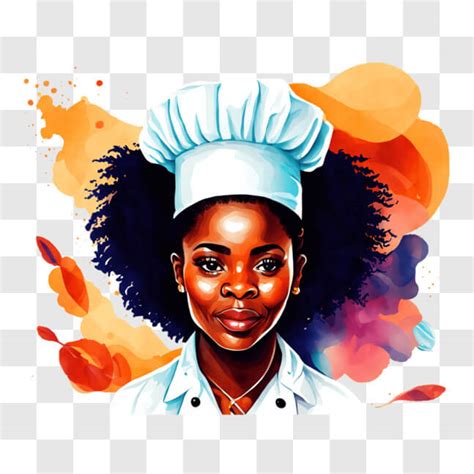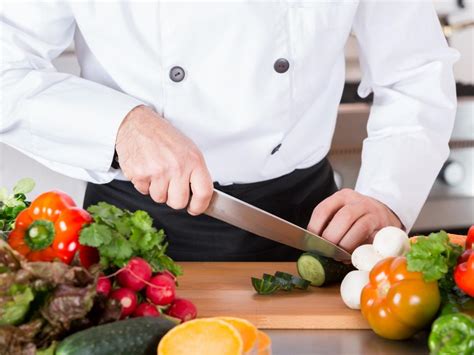Embarking on a journey towards a career in the culinary arts is like stepping into a world full of infinite and tantalizing possibilities. It's a path that allows you to delve into the art of gastronomy, the science of flavors, and the mastery of culinary techniques. If you have always been captivated by the magic that happens in the kitchen and have an insatiable passion for creating delectable delights, then a culinary career might just be the perfect fit for you.
When you choose to embark on this culinary odyssey, you sign up for a lifetime of constant learning, exploration, and creativity. As a chef, you have the exciting opportunity to not only make food, but also to craft experiences, evoke emotions, and ignite the senses of those who partake in your culinary creations. It's a profession that demands dedication, perseverance, and an endless quest for excellence.
At the heart of the culinary world lies the desire to bring joy and pleasure to people through food. It's a language that transcends borders, cultures, and backgrounds. From the tantalizing aroma of freshly baked bread to the intricate presentation of a gourmet dish, every aspect of culinary artistry is an expression of creativity and passion. As a chef, you not only satisfy hunger, but also have the power to create memories and leave a lasting impression on those fortunate enough to taste your dishes.
However, the culinary industry is not for the faint-hearted. It demands an unwavering commitment to honing your skills, pushing your boundaries, and embracing challenges head-on. It's a field where the stakes are high, the hours are long, and the pressure is intense. But for those who are willing to put in the effort and possess the drive to excel, the rewards are truly unparalleled. From working in renowned Michelin-starred restaurants to owning your own gastronomic empire, the possibilities are endless for those who are dedicated to their craft.
The Journey Towards a Culinary Profession: Acquiring Knowledge and Skills
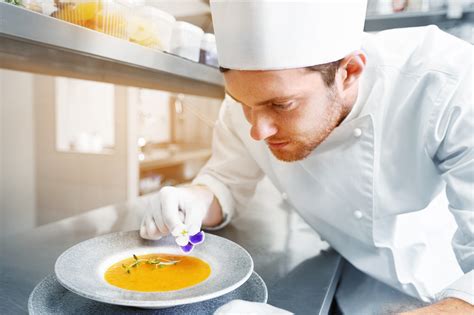
In the pursuit of a career in the culinary arts, individuals embark on a transformative journey that involves acquiring a vast array of knowledge and skills. This path towards becoming a chef demands dedication, perseverance, and a passion for the culinary craft. To fully embark on this journey, aspiring chefs must arm themselves with the necessary education and training, which provide the foundation for their future success.
Education: Obtaining a solid education is paramount for those aspiring to excel in the culinary world. Many culinary schools and institutes offer comprehensive programs that cover various aspects of the culinary arts. These educational institutions aim to equip students with both theoretical knowledge and practical skills necessary for a successful culinary career. Students delve into subjects such as food science, nutrition, ingredient sourcing, culinary techniques, menu planning, and much more.
Training: While education lays the groundwork, practical training plays an equally vital role in shaping a chef's expertise. Apprenticeships and culinary internships provide invaluable hands-on experience in professional kitchens, exposing aspiring chefs to the fast-paced, demanding nature of the industry. Working alongside experienced chefs in real-world settings allows individuals to refine their culinary techniques, develop their creativity, and gain a deeper understanding of the culinary industry's dynamics.
Continuing Education: The journey to becoming a chef does not end with the acquisition of basic education and practical training. To stay relevant and enhance their skills, chefs must embrace lifelong learning. They can embark on advanced culinary programs, participate in workshops, attend seminars, and engage in immersive experiences such as food tours and culinary travels. By continually broadening their knowledge and embracing new culinary trends, chefs can stay at the forefront of the industry and establish themselves as prominent culinary professionals.
In conclusion, the path towards becoming a chef involves a combination of formal education, practical training, and ongoing professional development. This progressive journey equips individuals with the necessary knowledge, technical skills, and creativity to excel in the culinary world. By investing in their education and honing their craft through practical experiences, aspiring chefs can pave the way to a fulfilling and successful career in the dynamic realm of culinary arts.
Exploring Culinary Schools: Finding the Perfect Fit
Embarking on a culinary journey involves carefully selecting the ideal educational institution to cultivate your passion for the culinary arts. Discovering the perfect culinary school requires thorough research and consideration of various factors to ensure a rewarding and fulfilling experience. This section will guide aspiring chefs on how to choose the culinary school that best aligns with their unique preferences and goals.
| 1. Location | Consider the location of the culinary school as it can greatly impact your overall experience. Some may prefer studying in a bustling city with diverse culinary scenes, while others may thrive in a peaceful countryside setting. Assessing the location's accessibility and proximity to potential job opportunities within the culinary industry is crucial. |
|---|---|
| 2. Accreditation | Ensure that the culinary school you choose is accredited by recognized culinary associations or educational bodies. Accreditation guarantees that the school meets specific standards of quality and excellence in culinary education. |
| 3. Curriculum and Specializations | Examine the curriculum offered by each culinary school and determine whether it aligns with your culinary interests and goals. Some schools may specialize in specific cuisines or culinary techniques, allowing you to focus on your desired niche. |
| 4. Faculty and Staff | Research the qualifications and experience of the culinary school's faculty and staff members. Experienced instructors who have worked in the culinary industry can provide valuable insights and mentorship, enhancing your learning experience. |
| 5. Facilities and Resources | Evaluate the facilities and resources available at each culinary school. State-of-the-art kitchens, well-equipped culinary labs, and access to quality ingredients are essential for honing your skills and understanding the intricacies of the culinary world. |
| 6. Internship and Job Placement Opportunities | Consider the culinary school's track record in providing internship and job placement opportunities for its students. A strong network of industry connections and partnerships can significantly enhance your chances of securing employment in renowned culinary establishments. |
| 7. Alumni Success and Reputation | Explore the success stories of culinary school alumni and assess the institution's reputation within the culinary industry. Alumni achievements and the school's reputation can provide valuable insights regarding the quality of education and its impact on career prospects. |
| 8. Financial Considerations | Take into account the tuition fees, scholarships, and financial aid options offered by each culinary school. Finding a balance between cost and quality education is crucial in making an informed decision. |
By carefully evaluating these factors, aspiring chefs can make an informed decision when selecting a culinary school. Remember, choosing the right fit is essential to setting a strong foundation for a successful culinary career filled with creativity, passion, and endless possibilities.
Building a Solid Foundation: Key Skills for Aspiring Culinary Artists
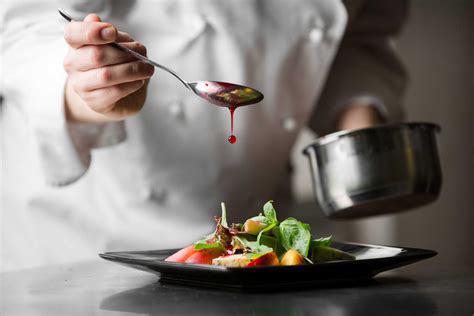
Developing a strong groundwork is essential for those who aspire to flourish in the realm of culinary arts. This section focuses on the fundamental skills that aspiring chefs should cultivate, enabling them to embark on a promising journey towards culinary excellence.
1. Pristine Knife Skills: Akin to a painter and their brush, a chef's knife is their primary tool. Mastering knife skills is imperative for precision and efficiency in the kitchen. From proper grip and cutting techniques to honing and sharpening, aspiring chefs must strive to attain mastery in this fundamental culinary skill.
2. Flawless Time Management: The intensity of a professional kitchen necessitates exceptional time management skills. Aspiring chefs must learn to prioritize tasks, plan and organize their workstations, and execute culinary creations within strict timelines. Effective time management ensures smooth operations and minimizes the likelihood of errors or delays.
3. Impeccable Taste and Palate: The ability to discern flavors, balance tastes, and create harmonious culinary compositions sets exceptional chefs apart. Developing an impeccable taste and palate requires thorough exposure to diverse ingredients and cuisines, as well as continuous experimentation and refinement of one's own culinary preferences.
4. Keen Eye for Detail: Meticulous attention to detail is central to a chef's craft. From plating dishes aesthetically to ensuring precise measurements and seasoning, aspiring chefs must cultivate a keen eye for even the minutest aspects. This attention to detail elevates a dish from being merely satisfactory to being truly remarkable.
5. Effective Communication Skills: Collaboration and communication lie at the heart of a functional kitchen. Aspiring chefs must hone their communication skills to effectively convey instructions, receive feedback, and work cohesively with team members. Clear and concise communication guarantees seamless coordination in a bustling culinary environment.
6. Adaptability and Creativity: The culinary world thrives on innovation and adaptation. Aspiring chefs ought to cultivate their creativity, thinking outside the box to develop unique flavor profiles and presentation styles. Being receptive to change and possessing the ability to adapt quickly to unforeseen circumstances are crucial traits for aspiring culinary artists.
7. Knowledge of Food Safety and Sanitation: Maintaining high standards of food safety and sanitation is non-negotiable in the culinary industry. Aspiring chefs must be well-versed in safe food handling practices, proper storage techniques, and maintaining a clean kitchen environment. Solid knowledge in this area ensures the well-being of both patrons and the culinary team.
By developing these essential skills, aspiring chefs can build a formidable foundation, paving their way towards a successful and fulfilling culinary career. Mastery of these skills not only ensures excellence in the kitchen but also contributes to personal and professional growth as a culinary artist.
Ascending the Culinary Ladder: Unveiling the Journey from Sous Chef to Head Chef
Embarking on an extraordinary voyage within the culinary realm involves more than just mastering the art of gastronomy. As aspiring individuals traverse through the realm of flavors and culinary craftsmanship, understanding the trajectory from a sous chef to a head chef becomes essential. This section unravels the intricate career progression within the culinary industry, shedding light on the unique challenges, skills, and achievements that define this awe-inspiring journey.
The Sous Chef: A Crucial Foundation
A sous chef, the invaluable right-hand to the head chef, plays a pivotal role in the seamless execution of kitchen operations. With their unwavering commitment and culinary expertise, sous chefs collaborate closely with the head chef to supervise food preparation, manage kitchen staff, and ensure the consistent delivery of delectable masterpieces. This position serves as an apprentice-like phase where aspiring culinary experts refine their skills, acquire hands-on experience, and gain a deeper understanding of the intricacies of running a professional kitchen.
Emerging as a Chef de Cuisine
After honing their craft as a sous chef to perfection, aspiring chefs may find themselves ready to embark on the next chapter of their career: the role of chef de cuisine. Commanding the kitchen with flair, a chef de cuisine oversees menu creation, ingredient sourcing, and culinary innovation. They are adept at inventing captivating flavors, crafting extraordinary dishes, and leading a team of culinary enthusiasts to accomplish culinary excellence. Mastering the art of balancing creativity, efficiency, and management, chef de cuisine sets the stage for the ultimate leap towards the summit of culinary success.
The Epitome of Culinary Mastery: The Head Chef
The pinnacle of culinary achievement lies within the realm of the head chef. This prestigious position embodies unparalleled culinary expertise, leadership, and creative genius. The head chef serves as the orchestrator of the culinary symphony, curating unforgettable dining experiences and pushing the boundaries of gastronomic innovation. With a firm grasp on flavor profiles, culinary techniques, and meticulous attention to detail, the head chef shapes and defines the culinary vision of an establishment. They inspire and mentor aspiring chefs, elevating the art of cooking to new heights and leaving an indelible mark on the culinary world.
Embarking on a voyage from sous chef to head chef demands unwavering passion, resilience, and a relentless pursuit of perfection. This career progression within the culinary realm offers a lifelong journey of growth, creativity, and endless possibilities.
Mastering the Craft of Culinary Techniques: Knife Skills, Flavor Pairing, and Beyond
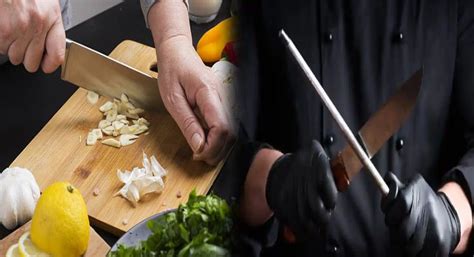
Embarking on a journey in the realm of culinary arts entails more than just a passion for food. One must strive to acquire a profound understanding and mastery of various culinary techniques that are essential to crafting exceptional dishes. This section delves into the art of culinary techniques, covering everything from honing knife skills to exploring the intricate world of flavor pairing.
Firstly, knife skills serve as the cornerstone of every chef's repertoire. The ability to wield a knife with precision and control is paramount in transforming mere ingredients into culinary works of art. From delicate julienne cuts to bold minces, mastering the intricacies of knife work involves honing techniques such as the classic French cuts or the Japanese-inspired precision cuts. Understanding the proper grip, angle, and motion are crucial to achieving consistent and professional results.
In addition to knife skills, an aspiring culinary artist must delve into the realm of flavor pairing. This fascinating branch of culinary knowledge involves harmonizing different ingredients to create unique and complementary taste profiles. Exploring the art of flavor pairing entails understanding the principles of taste, such as the balance of sweet and savory, the interplay of acidity and richness, and the delicate dance between contrasting flavors. With this knowledge, a chef can elevate their creations to new heights, surprising and delighting the palate of their diners.
Furthermore, developing an understanding of cooking techniques is essential for any culinary enthusiast. Techniques such as braising, sautéing, grilling, and baking play a vital role in transforming raw ingredients into delectable masterpieces. Each technique requires precision, timing, and an understanding of how heat interacts with ingredients to achieve desired flavors, textures, and presentations.
Moreover, it is essential to emphasize the significance of continuous learning and practice in perfecting these culinary techniques. Whether through formal culinary education, hands-on experience in professional kitchens, or self-study, the mastery of knife skills, flavor pairing, and various cooking techniques is a perpetual endeavor that rewards dedication and passion.
In conclusion, this section explores the fundamental aspects of mastering the art of culinary techniques. Through the practice and refinement of knife skills, the exploration of flavor pairing, and the understanding of various cooking techniques, aspiring chefs can unlock their full potential and create culinary wonders that tantalize the senses.
The Challenges and Rewards of a Culinary Journey:What Awaits You
Embarking on a culinary journey is a path filled with various challenges and rewards. As you venture into the world of gastronomy, you'll encounter obstacles that test your skills, resilience, and passion. However, along with these challenges come countless opportunities for growth and success that make the journey worthwhile.
1. Diversity of Cuisines: As a culinary professional, you'll have the chance to explore a rich tapestry of flavors and culinary traditions from around the globe. From mastering classic French techniques to experimenting with fusion cuisine, the possibilities are endless. Unleash your creativity and immerse yourself in the colorful world of spices, ingredients, and cooking styles.
2. Intense Work Environment: Be prepared for a fast-paced and demanding work environment. Culinary careers often involve long hours, tight deadlines, and pressure-cooker situations. The heat of the kitchen can be both physically and mentally challenging. However, this high-energy atmosphere fosters teamwork, camaraderie, and the constant pursuit of excellence.
3. Continuous Learning: The culinary field is ever-evolving, with new trends, techniques, and ingredients constantly emerging. As a chef, you'll need to stay updated on the latest culinary advancements and continuously expand your skill set. Embrace the opportunity to attend workshops, collaborate with fellow professionals, and push your boundaries to keep your culinary repertoire fresh and exciting.
4. Physical Demands: A culinary career requires stamina, endurance, and physical agility. You'll spend hours on your feet, maneuvering through a bustling kitchen, lifting heavy pots and pans, and engaging in repetitive motions. Regular exercise and proper self-care become essential to maintain your health and well-being in this physically demanding profession.
5. Creativity and Expression: Despite the challenges, a culinary career offers unparalleled opportunities for creativity and self-expression. With each dish, you have a canvas to showcase your artistic flair, combining flavors, textures, and presentation to create a masterpiece. This artistic outlet allows you to leave a lasting impact on the palates and memories of those who enjoy your culinary creations.
6. Culinary Community: In the world of gastronomy, you'll find a vibrant community of like-minded individuals who share your passion for food. Building connections with fellow chefs, industry professionals, mentors, and food enthusiasts can enrich your culinary journey. These connections provide support, inspiration, and valuable networking opportunities that can open doors to exciting avenues in your career.
As you embark on your culinary adventure, keep in mind that the challenges you encounter are stepping stones towards personal and professional growth. Embrace the rewards and overcome the obstacles along the way, knowing that the gratification of pursuing your culinary dreams is truly one-of-a-kind.
Thriving in the Kitchen: Tips for Achieving Success as a Culinary Professional
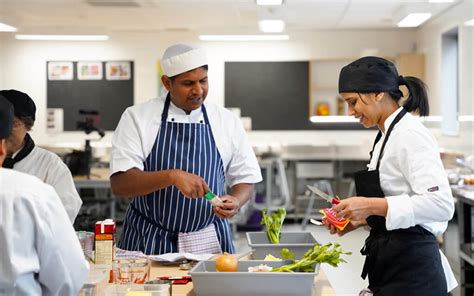
In this section, we will explore essential guidance and strategies for excelling in the culinary world. It is imperative to master not only the technical skills, but also cultivate a strong work ethic and a passion for the craft. We will delve into various aspects that contribute to a chef's success, ranging from continuous learning and creativity to effective teamwork and time management.
Continuous Learning and Growth: The culinary industry is dynamic and constantly evolving. To thrive as a culinary professional, it is crucial to embrace a lifelong commitment to learning. This involves staying updated on the latest techniques, ingredients, and culinary trends. Taking part in workshops, attending culinary conferences, and reading industry publications are excellent ways to expand your knowledge and skills.
Cultivating Creativity: As a chef, creativity is your finest tool. It allows you to innovate, experiment with flavors, and create unique culinary experiences. Cultivate your creativity by exploring diverse cuisines, experimenting with unconventional ingredients, and pushing the boundaries of traditional recipes. Embrace a mindset that encourages experimentation and always strive to deliver extraordinary culinary experiences to your guests.
Effective Teamwork: The kitchen is a collaborative environment, and success as a chef heavily relies on your ability to work well with others. Strong communication skills, the ability to listen actively, and a cooperative attitude are essential. Foster a positive work culture where teamwork thrives, ensuring a smooth and efficient operation in the kitchen. Remember, a successful team rewards everyone involved.
Time Management Skills: Working in a kitchen requires excellent time management skills. Develop the ability to prioritize tasks, estimate preparation times accurately, and work efficiently under pressure. Time management is crucial not only to ensure the smooth running of the kitchen but also to maintain a healthy work-life balance. Learn to manage your time well to avoid unnecessary stress and burnout.
Pursuit of Excellence: A successful chef always strives for excellence in every dish that leaves the kitchen. Consistency, attention to detail, and a commitment to delivering the highest quality food are paramount. Continuously refine your techniques, seek feedback from peers and customers, and seize every opportunity to improve. Excellence is a never-ending journey, and chefs who embrace this mindset are destined for greatness.
By embracing continuous learning, cultivating creativity, fostering effective teamwork, mastering time management, and pursuing excellence, aspiring chefs can lay a solid foundation for a thriving and successful culinary career. Remember, success in the kitchen goes beyond technical skills; it encompasses passion, dedication, and the drive to consistently surpass expectations.
FAQ
What skills do I need to become a chef?
To become a chef, you need a combination of culinary skills, creativity, attention to detail, strong work ethic, ability to handle pressure, and good organizational skills. It is also important to have a passion for food and a willingness to constantly learn and improve your cooking techniques.
What education do I need to pursue a culinary career?
While a formal culinary education is not always required, it can greatly enhance your chances of success in the industry. Many aspiring chefs choose to attend culinary schools or institutes, where they learn the fundamentals of cooking, food safety, nutrition, menu planning, and kitchen management. However, practical experience and on-the-job training are equally important in the culinary field, so working in a professional kitchen is highly recommended.
What are the career prospects for chefs?
The culinary industry offers a wide range of career opportunities for chefs. After gaining experience working in restaurants, you can pursue various paths such as becoming a sous chef, executive chef, or even opening your own restaurant. Additionally, you can explore opportunities in catering, hotel and resort kitchens, food styling, research and development, culinary education, and food writing. With the right skills and dedication, there are numerous opportunities to grow and advance in the culinary field.
What is the average salary of a chef?
The salary of a chef can vary depending on factors such as experience, geographical location, and the type of establishment they work in. Generally, entry-level positions may have lower salaries, while executive chefs in high-end restaurants or hotel chains can earn significantly higher incomes. According to the Bureau of Labor Statistics, the median annual wage for chefs and head cooks in the United States was around $51,530 in May 2020.
What are the challenges of pursuing a career as a chef?
Pursuing a culinary career can be physically and mentally demanding. Chefs often work long hours, including evenings, weekends, and holidays. The fast-paced and high-pressure environment of the kitchen can be stressful. Additionally, the culinary field is highly competitive, and success requires continuous learning, creativity, and keeping up with food trends. However, for those who are passionate about food and cooking, the rewards of a culinary career can outweigh the challenges.
What are the steps to become a chef?
To become a chef, you should start by gaining a basic education in culinary arts. This can be done by enrolling in a culinary school or a vocational program. After obtaining the necessary education, it is important to gain practical experience by working as an apprentice or intern in a professional kitchen. Additionally, building a strong network in the industry and continuously learning and improving your skills are essential steps towards becoming a successful chef.
Is culinary school necessary to become a chef?
While culinary school is not mandatory to become a chef, it can be highly beneficial. Culinary schools provide a structured and comprehensive education in culinary arts, where you can learn various techniques, develop your palate, and gain knowledge about different cuisines. Moreover, attending culinary school often gives you an advantage in the competitive job market, as many employers prefer candidates with formal culinary education.
